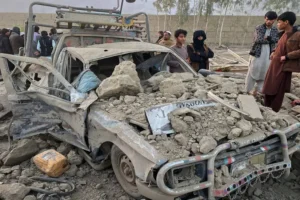
Pakistan Claims “Credible Intelligence” of Possible Attack in 36 Hours
Pakistan Defense Minister Statement: In a major development which has further escalated the already fragile relationship between India and Pakistan, Pakistan’s Information and Broadcasting Minister Attaullah Tarar warned that India may launch an armed forcible attack in the next 24 to 36 hours. This was a reference to the April 22 terrorist attack in Pahalgam, Indian-administered Kashmir that left 26 tourists dead.
In a post to social media on Wednesday, Tarar alleged that India is using the Pahalgam tragedy as a “falsified pretext” to act with hostility, and emphasized that if India takes any military action, Pakistan will respond forcefully. No evidence was provided to support the claim, however.
“Any unprovoked military action will elicit a strong response.” “India will take full responsibility for any major consequences in the region,”Tarar posted on X (formerly Twitter).
No Public Response from the Indian Government Yet
So far, the Indian Ministry of External Affairs has not made any public statements on the allegations, the relationship is still hostile, with New Delhi blaming Islamabad for a continued “environment for terrorists” operating loosely from Pakistan.
The attack has been attributed to The Resistance Front (TRF), which has been described as an offshoot of the Lashkar-e-Taiba militant group in Pakistan.
Indian Prime Minister Narendra Modi has committed to holding those responsible accountable, signalling a possible hard response. While there is no close support of military action, security analyst reporting hints that India could be readying its military assets for a limited cross border strike to reestablish sovereign claims as it has in the past in relation to terrorist attacks.
In a further troubling sign of the possibilities for a militarized response, Pakistan’s Defence Minister Khawaja Muhammad Asif remarked to Reuters that an Indian military response appeared unavoidable. He noted that Pakistan is remaining cautious, but their nuclear weapons will only be used, “when there is a direct threat to our existence.”
Pakistan Defense Minister Statement represents a serious increase in aggressiveness, especially concerning their respective nuclear arsenals and their longstanding disagreements over Kashmir.
Diplomatic Consequences: Airspace Bans; Treaty Abrogation
The two neighbouring countries have quickly damaging their their diplomatic relationship since the Pahalgam attack. India cancelled numerous visas for Pakistani citizens and withdrew participation in the Indus Waters Treaty, a prominent historic treaty regarding the sharing of waters from Indus River.
This resulted in protests throughout Pakistan, and the Pakistani government has claimed that it will take legal avenues against India’s unilateral pull out.
Pakistan has also banned Indian airlines from using its airspace, putting already tenuous civil relations and economic ties at further risk. There have been, in effect, shots fired across the Line of Control (LoC), the de facto border of Kashmir, which has raised fears of escalation in military actions.
Global Fears of Escalation
These serious developments have garnered the world’s attention. On Tuesday, the U.S. Department of State encouraged both countries to find a “responsible solution” to immediately de-escalate the tensions. Marco Rubio, Secretary of State, is expected to contact the Foreign Ministers of both nations to urge conversations.
The United Nations has taken steps to intervene with Secretary-General Antonio Guterres contacting both the Prime Minister of Pakistan Shehbaz Sharif and India’s Minister of External Affairs Subrahmanyam Jaishankar.
“A spokesperson for the United Nations stated that “The Secretary-General underlined the necessity to avoid a conflict that could have tragic consequences.”
Recent News updates India: What to Follow
This occurrence is the most recent news event in India that has received massive amount of scrutiny in a regional and global geopolitical context more than likely in our times. Experts suggested that while a broader scale war is unlikely some sort of military confrontation is conceivable.
As international scrutiny and sentiment build, the next 36 hours will be very important in terms of whether the crisis can enhanced/more through diplomacy, or deteriorate more.
Final Comments
As Pakistan rings the alarm bell and India remains ambiguous, the sub-continent is in a delicate position. The potential for the two nuclear neighbors to avoid military conflict will depend largely on discreet diplomacy, international mediation and longer line decisions from their leaders.






